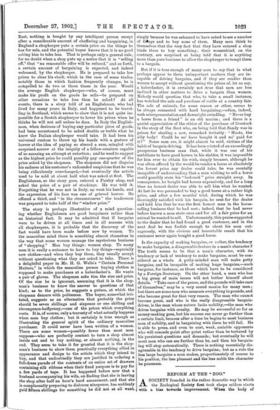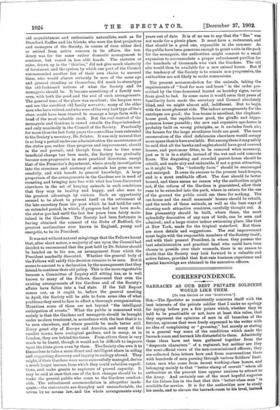REFORM AT THE "ZOO."
ASOCIETY founded in the rather domestic way in which the Zoological Society first took shape seldom starts with a bias towards improvement. When the body of
-old acquaintances and enthusiastic naturalists, such as Sir Stamford Raffles and his friends, who were the first projectors and managers of the Society, in course of time either died or retired from active concern in its affairs, the ten- dency was for the same rather domestic management to continue, but vested in less able hands. The statutes or rules, drawn up in the thirties," did not give much elasticity of treatment, and the system by which one part of the Council recommended another list of their own choice to succeed them, who would almost certainly be men of the same age and general standing as themselves, did much to stereotype the old-fashioned notions of what the Society and its menagerie should be. It became something of a family con- cern, with both the good and the evil of such arrangements. The general tone of the place was excellent; the keepers were and are like excellent old family servants; many of the elder men who have retired, and who were of the very best type of their class, could have been trusted to manage a large farm with a head of the most valuable stock. But the real control of the menagerie and Gardens is vested outside the Superintendent and only nominally in the Council of the Society. Practically for more than the last forty years the control has been entrusted to the Society's secretary, Dr. Sclater. It was only natural that in so long a period underone administration the maintenance of the status quo, rather than progress and improvement, should in the end prevail; and though from time to time some beneficial change has been made, the Society has gradually become non-progressive in most practical directions, except that of the Prosectoes department, where steady investigation into the structure and anatomy of animals has gone on suc- cessfully, and with benefit to general knowledge. A large proportion of the arrangements in the Gardens are in need of recasting and bringing into line with what has been discovered elsewhere in the art of keeping animals in such conditions that they may be healthy and happy, and also seen to the greatest advantage by visitors. Such an opportunity seemed to be about to present itself on the retirement of the late secretary from the post which he had beld,for such an extended period, in which, if progress had not been made, the status quo had until the last few years been fairly main- tained in the Gardens. The Society had been fortunate in having obtained the consent of the Duke of Bedford, the greatest acclimatiser ever known in England, young and energetic, to be its President.
It was not without natural misgivings that the Fellows learnt that, after short notice, a majority of one upon the Council had decided to recommend that the post held by Dr. Sclater should be handed on to his son, an arrangement from which the President markedly dissented. Whether the general body of the Fellows will ratify this decision remains to be seen. But it seems to amount to a declaration by the management that they intend to continue their old policy. This is the more regrettable because a Committee of Inquiry still sitting has, as is well known to many of the Fellows, discovered that even the existing arrangements of the Gardens and of the Society's affairs have fallen into a bad state. If the full Report comes out, as it ought to, before the general meeting in April, the Society will be able to form some idea of what problems they need to face to effect a thorough reorganisation. Meantime some of them are not beyond "the intelligent anticipation of events." What the public is concerned with mainly is that the Gardens and menagerie should be brought under modern treatment, in accordance with the beat that is to be seen elsewhere, and where possible be made better still. Every great city of Europe and America, and many of the smaller towns, have zoological gardens, and in many, as in London, they are behind the times. From others there is very much to be learnt, though it would not be difficult to improve upon the hints given even by them. The Society also owe it to themselves to take a more direct and intelligent share in aiding and suggesting discovery and inquiry in zoology abroad. They might, if their Gardens were more successfully managed, derive a much larger income, from which they could subsidise expedi- tions, and make grants to explorers of proved capacity. It may be said at once that one of the first changes should be to make the general public who come to the Gardens comfort- able. The refreshment accommodation is altogether inade- quate,—the restaurants are draughty and uncomfortable, the mines by no means low, and the whole arrangements sixty years out of date. It is of no use to say that the " Zoo " was not made for a picnic place. It must have a restaurant, and that should be a good one, expansible in the summer. As the public have been generous enough to grant a site in the park for the menagerie, the authorities might consent to a small expansion to accommodate a proper refreshment pavilion for the hundreds of thousands who visit the Gardens. The old site would then be available for a new animal house. But if the tendency of the Society is to remain non-progressive, the authorities are not likely to make concessions.
The present accommodation for the animals, taking the requirements of "food for man and beast" in the order pre- scribed by the time-honoured legend on hostelry signs, varies from good to bad. In some cases it would seem that years of familiarity have made the secretary and Council absolutely blind, and we might almost add, indifferent. But to begin with the more pleasant side. The indoor arrangements for the antelopes are good ; the lion-house is excellent, the elephant,- house good, the reptile-house good, the giraffe and hippo- potamus house passable ; the new and expensive ape-house is probably built on wrong principles, as it excludes fresh air; the houses for the large struthious birds are good. The mere enumeration of the chief deficiencies elsewhere would occupy more space than is here available. But among them it may safely be said that all the hawks and eagles should have good covered houses, and peat-moss litter, to be removed when necessary, just as it is in a stable, instead of the wet and cold concrete floors. The disgusting and crowded parrot-house should be rebuilt, and made airy and endurable, if not a great attraction, as it might be. The "butterfly farm" should be encouraged and enlarged. It owes its success to the present head-keeper, and is a most creditable effort. The deer should be better housed, and there seems no reason why the authorities might not, if the reform of the Gardens is guaranteed, allow their runs to be extended into the park, where in return for the use of the ground the public could see them for nothing. The cat-house and the small mammals' houses should be rebuilt, and the needs of these animals, as well as the best ways of showing such attractive creatures, carefully thought out. A fine pheasantry should be built, where these, the most splendidly decorative of any race of birds, can be seen and admired; and a large winter indoor swimming place, like that at New York, made for the tropical waterfowL But these are mere details and suggestions. The real improvement must begin with the responsible members of the Society itself; and with their present President, in whom they possess the best administrative and practical head who could have been chosen to preside over their counsels, there is no reason to doubt that the Society may look forward to a valuable and active future, provided that first-rath business experience and special knowledge are obtained in the executive officers.







































 Previous page
Previous page